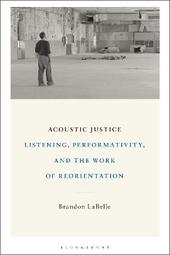
|
Acoustic Justice: Listening, Performativity, and the Work of Reorientation
Paperback / softback
Main Details
| Title |
Acoustic Justice: Listening, Performativity, and the Work of Reorientation
|
| Authors and Contributors |
By (author) Brandon LaBelle
|
| Physical Properties |
| Format:Paperback / softback | | Pages:264 | | Dimensions(mm): Height 229,Width 152 |
|
| Category/Genre | Music
Acoustic and sound engineering |
|---|
| ISBN/Barcode |
9781501368219
|
| Classifications | Dewey:781.17 |
|---|
| Audience | | Tertiary Education (US: College) | | Professional & Vocational | |
|---|
|
Publishing Details |
| Publisher |
Bloomsbury Publishing Plc
|
| Imprint |
Bloomsbury Academic USA
|
| Publication Date |
14 January 2021 |
| Publication Country |
United States
|
Description
Acoustic Justice engages issues of recognition and misrecognition by mobilizing an acoustic framework. From the vibrational intensities of common life to the rhythm of bodies in movement, and drawing from his ongoing work on sound and agency, Brandon LaBelle positions acoustics, and the broader experience of listening, as a dynamic means for fostering responsiveness, understanding, dispute, and the work of reorientation. As such, acoustic justice emerges as a compelling platform for engaging struggles over the right to speak and to be heard that extends toward a broader materialist and planetary view. This entails critically addressing questions of space, borders, community, and the acoustic norms defining capacities of listening, leading to what LaBelle terms "poetic ecologies of resonance." Acoustic Justice works at issues of recognition and resistance, place and displacement, by moving across a range of pertinent references and topics, from social practices and sound art to the performativity of skin and the poetics of Deaf voice. Through such transversality, LaBelle captures acoustics as the basis for strategies of refusal and repair.
Author Biography
Brandon LaBelle is an artist, writer, and theorist working with sound culture, voice, and questions of agency. His books Acoustic Territories, Second Edition (2019), Background Noise, Second Edition (2015), and Lexicon of the Mouth (2014), are all published by Bloomsbury Academic. He is the Editor of Errant Bodies Press, Berlin, and Professor at the Art Academy, University of Bergen, Norway.
ReviewsThis is yet another delightful read on sonic agency by Brandon LaBelle, highlighting this time what is at stake when we think of social and political transformation as an acoustic question. In Acoustic Justice, LaBelle takes the readers through thrilling discussions on 'hearing differently,' on 'generous infrastructure' and 'relating otherwise' - all of them involved in reconfiguring our capacity to act politically. LaBelle's unique approach offers insight into the temporal and situational realms of sound and listening that are fleeting yet necessary for any process of reimagining political possibilities. In the world today, marked by intense structural feelings of uncertainty and fragility, his theorizing of an impersonal, distributed, and collaborative political agency is not just refreshing but indeed very much needed. This book resonates across various fields of social sciences and humanities and is an essential reading for those interested in political theory, sound studies, resistance, and affect theory. * Ana Hofman, Senior Research Fellow, Research Centre of Slovenian Academy of Sciences and Arts, Slovenia * Brandon LaBelle's Acoustic Justice makes important contributions to the scholarship on sound, politics and the public sphere. Exploring how listening as a form of attentiveness functions in an arena of sonic agency, LaBelle deftly illustrates how an acoustic justice exercises a democratic collective action. This is a non-state form of democracy with the capacity to bring into being an extrajudicial civic body, one with greater capacity for what he calls 'hearing differently.' Hearing differently accounts for differences in what is or can be heard as a result of silences, gaps, deafnesses, or absences. Offering up acoustics as a metric for both material and social relations, LaBelle dynamically reads the encounter between the organic and built environments as a 'distribution of the heard' invigorating our understanding of the polis as a social acoustic phenomenon. * Roshanak Kheshti, Associate Professor of Ethnic Studies, University of California, San Diego, USA * Labelle is such a playful and expansive thinker. Acoustic Justice draws so much together across art, philosophy, activism, and beyond to sound an urgent intervention in the politics of attention: a commitment both to hearing differently and to hearing difference. This is an account of acoustics unbound from the audible and an account of justice just 'to the side of law,' that migrates in and out of the legal system and insists on the need for a fair hearing 'in the space of the ordinary.' * James E K Parker, author of Acoustic Jurisprudence: Listening to the Trial of Simon Bikindi (2015) *
|